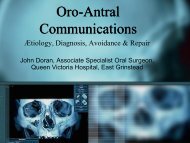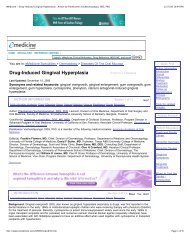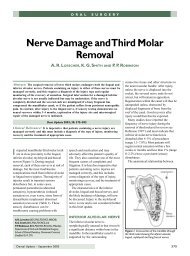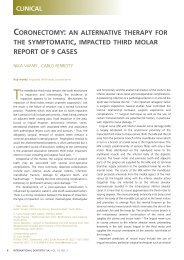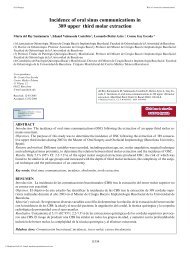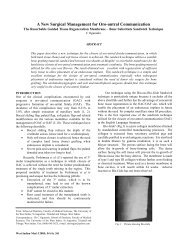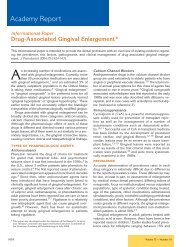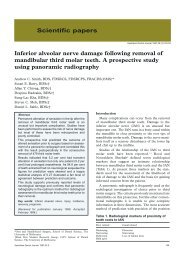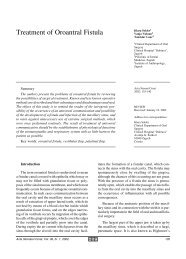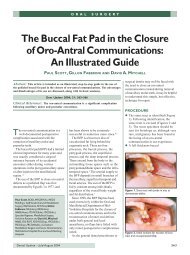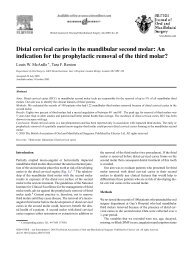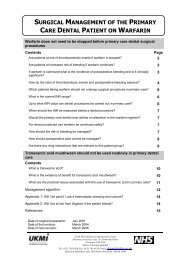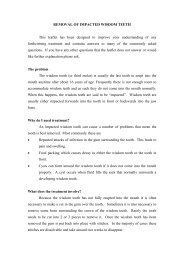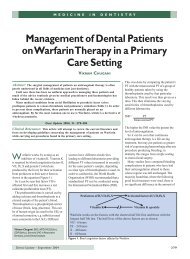Oral Surg Oral Med Oral Pathol Oral Radiol Endod 2004 - Surgical ...
Oral Surg Oral Med Oral Pathol Oral Radiol Endod 2004 - Surgical ...
Oral Surg Oral Med Oral Pathol Oral Radiol Endod 2004 - Surgical ...
You also want an ePaper? Increase the reach of your titles
YUMPU automatically turns print PDFs into web optimized ePapers that Google loves.
ORAL SURGERY ORAL MEDICINE ORAL PATHOLOGY<br />
Volume 97, Number 1<br />
some symptomatic improvement in some patients requiring<br />
palliative care, 183 and another more-recent<br />
study demonstrated the benefits of a regimen of 3 to 4<br />
weekly treatments followed by monthly sessions. 184<br />
Dietary supplementation. The results of 1 placebo-controlled<br />
investigation suggested that a herbally<br />
based agent with vitamin supplements (LongoVital,<br />
LV, Denmark) cause a prolonged increase in unstimulated<br />
salivary flow and a reduction in rose bengal dye<br />
scores in a group of patients with SS. 185<br />
It has been suggested that evening primrose oil, rich<br />
in fatty acids and important in inhibiting 2-series prostaglandins,<br />
may enhance salivary flow in some individuals<br />
with SS. 186-188 It has also been suggested that<br />
those with drug-induced xerostomia may benefit from<br />
chewing cappuccino coffee, yet only temporary improvement<br />
is provided for xerostomia. 189 Positive effects<br />
on symptoms in patients with SS were seen after<br />
the use of linseed extract Salinum with or without<br />
chlorhexidine. 190<br />
Immunologically active agents<br />
SS is an autoimmune exocrinopathy characterized by<br />
a destructive T-lymphocyte response and the release of<br />
a range of cytokines. 94 Thus, if it were possible to<br />
modulate these responses, it might be possible to suppress<br />
gland damage. A number of modalities have been<br />
explored.<br />
Interferon . The results of open-label studies<br />
have suggested that intramuscular (eg, 1 10 6 IU/<br />
wk 191 ) and parenteral (3 10 6 three times weekly 192 )<br />
interferon increases the lacrimal and salivary flow of<br />
patients with primary and secondary SS. However, in<br />
contrast, systemic interferon commonly gives rise to<br />
a wide range of adverse effects including xerostomia 193<br />
and perhaps SS 194 ; thus, lower dosage modalities were<br />
indicated. Subsequent open-label and single-blinded<br />
studies also suggested that interferon –containing lozenges<br />
(150 IU interferon 3 times daily) might reduce<br />
the severity of xerostomia in primary and secondary<br />
SS, with clinical benefit being observed in some persons<br />
after 9 weeks of therapy. 195-197 Both the parenteral<br />
and oral interferon therapy caused a reduction in the<br />
mononuclear cell infiltrate and increased the normal<br />
architecture of examined labial salivary glands. A randomized,<br />
controlled study confirmed that therapy with<br />
interferon lozenges (150 IU 3 times daily) for 12<br />
weeks tended to increase unstimulated salivary flow,<br />
significantly increased stimulated whole salivary flow,<br />
lessened associated oral symptoms, and did not give<br />
rise to adverse side-effects. A higher dosage of interferon<br />
than 150 IU does not impart any additional<br />
benefit. 198<br />
The precise mechanisms by which oral interferon <br />
Porter, Scully, and Hegarty 39<br />
increases salivary function in SS remain unclear because<br />
interferon is inactivated by the gastrointestinal<br />
tract and is not detectable in blood after oral ingestion.<br />
However, interferon augments the transcription and<br />
production of aquaporin-5, which, in vitro, is a membrane-bound<br />
protein important in lacrimal and salivary<br />
gland function 199 ; therefore, interferon may act by<br />
both attenuating autoimmune-driven salivary gland<br />
damage and influencing water transportation through<br />
the up-regulation of aquaporin-5.<br />
Corticosteroids. Systemic corticosteroids may<br />
be beneficial for the management of accompanying<br />
connective tissue disorders, but there are conflicting<br />
data of the precise benefits in reducing the oral or<br />
ocular symptoms of SS. The results of one randomized<br />
study suggested that prednisolone (30 mg on<br />
alternate days) was effective, 200 whereas a more<br />
recent investigation found that lower doses of prednisolone<br />
were not clinically useful (although the<br />
levels of relevant serologic markers did fall). 201 Of<br />
interest, corticosteroid irrigation of the major glands<br />
(eg, with prednisolone 2 mg/mL in saline solution)<br />
may be clinically useful by increasing salivary flow<br />
rates, particularly in patients in the early stages of<br />
disease. 202 A recent case study reported that oral<br />
prednisolone improved acetylcholine-induced sweating<br />
in a patient with anhidrosis related to SS. 203<br />
Another case study reported an improvement in clinical,<br />
histologic, and immunohistologic parameters<br />
after the use of high-dose steroids in the treatment of<br />
SS. 204<br />
Hydroxychloroquine. Hydroxychloroquine may<br />
be of some clinical benefit at dosages of 6 to 7 mg/kg/<br />
day, producing a reduction in serum IgG and IgM<br />
levels and C-reactive protein and erythrocyte sedimentation<br />
rates and a fall in salivary levels of IL-6 in<br />
SS, 205-208 all without causing significant retinopathy.<br />
205,206 However, the clinical efficacy of hydroxychloroquine<br />
appears variable and benefit may only occur<br />
if the drug is prescribed for periods greater than 1<br />
year. 205,208-212 Long-term studies are therefore required<br />
to determine the precise clinical benefits of hydroxychloroquine<br />
in the management of SS. 213,214<br />
Other Immunosuppressants<br />
Azathioprine has not proved effective for the management<br />
of the xerostomia of SS 215 . Systemic cyclosporine<br />
produced some improvement in subjective xerostomia,<br />
but it did not produce any other relevant<br />
clinical improvement. 216<br />
Cyclophosphamide was reported to be of benefit in<br />
the management of secondary SS in one young<br />
adult 217 . Sulfasalazine was not of benefit in the treatment<br />
of primary SS. 218 Methotrexate does not seem to



